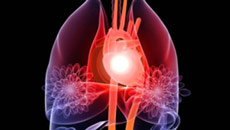An Indian-origin researcher-led team has created the most detailed map to date of a region of the human eye, long associated with blinding diseases, such as age-related macular degeneration.
By seeing differences in protein abundance in this eye region, researchers can figure out which proteins may be the critical actors in vision loss and eye disease.
Understanding eye diseases is tricky enough. Knowing what causes them at the molecular level is even more confounding.
The high-resolution molecular map catalogues thousands of proteins in the choroid that supplies blood and oxygen to the outer retina, itself critical in vision.
"This molecular map now gives us clues why certain areas of the choroid are more sensitive to certain diseases, as well as where to target therapies and why," said Vinit Mahajan, assistant professor in ophthalmology at University of Iowa.
What vision specialists know is many eye diseases, including age-related macular degeneration (AMD), are caused by inflammation that damages the choroid and the accompanying cellular network known as the retinal pigment epithelium (RPE).
Mahajan and Jessica Skeie, post-doctoral researcher in ophthalmology at University of Iowa, created a map that catalogues more than 4,000 unique proteins in each of the three areas of the choroid-RPE - the fovea, macula and the periphery.
"This has helped explain why certain genes are associated with macular degeneration and helps point us to new treatment targets," Skeie concluded in a paper published in the journal JAMA Ophthalmology.





